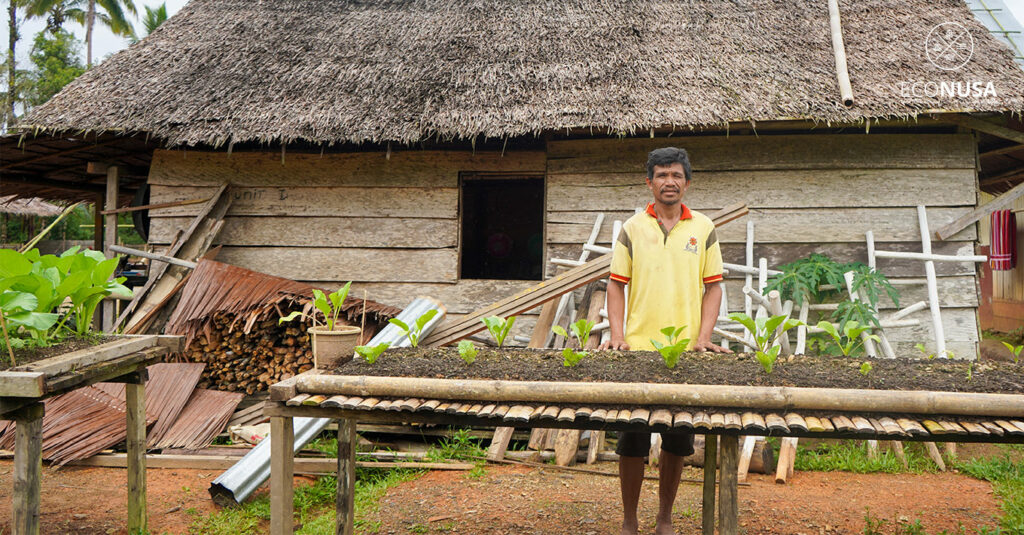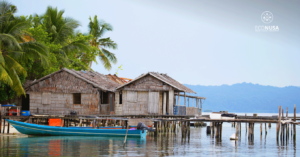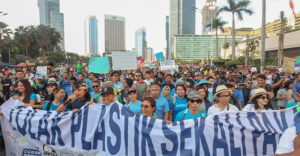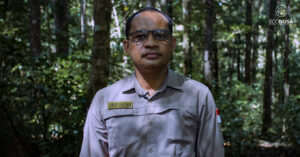
Rona Matital bent down to pull out thick grass in the garden she managed with her fellow churchgoers in her village. Despite her quite surprise upon seeing the grass, her face shone brightly to see the fertile peanut she had nurtured with her fellows. Rona believed that her crops would be as better as the former ones. “The crop is good. We earned 9 sacks,” said Rona, Wednesday 18 May 2022.
In a one-hectare garden, around 50 women of the church congregation in Manusa Village, Seram Bagian Barat, Maluku, had planted peanuts and chilly a year before. It was the first time they shared the same garden.
Read also: STS Morekau Closing, Sharing Session for Village Development
The crops were quite satisfying. They could collect around 450 kilograms of peanuts which is valued at around Rp3.2 million, and 18 kilograms of chilly in three harvest time valuing at Rp900,000. “The crops were sold to the churchgoers at the village,” said Sherlina Makaruku.
It was Noce Rumahpasal who initiated the gardening here. Noce was a mere elementary school graduate, and he was one of participants of the Saka Mese Nusa Social Transformation School (STS) originated by EcoNusa. The program was held in Morekau Village, Seram Bagian Barat, in Maluku Province on 8-25 February 2021. There were three classes here, namely organic farming, biogas, and multipurpose drying classes. Noce joined the biogas class.
After class, Noce secretly absorbed the lessons given in organic farming class. After STS, he called the village government to support his effort to craft biogas and paddy planting. The biogas was turned down because there is only small number of cows in their village. “I also coordinate with the village government to clear land and create paddy field. But the government has no budget,” he said.
Read also: STS Just a Start
Noce eventually created his own garden to plant chilly. He practiced organic fertilizer production as instructed in the farming class. The chilly grew well. He sold the crops in Gemba City. In one crop, he could earn about Rp1 million. “I use the money to support my children school tuition, household spending, affording seeds, and transportation,” he said.
Noce and other Manusa villagers spent their own money to afford transportation fare due to the limited access. Manusa is located at the mountainous areas in the center of Seram Bagian Barat. From Gemba, it takes 3 hours to go to Manusa which cost Rp200,000 by motor taxi or Rp250,000-300,000 per person by four-wheeled car.
There is only one driver who has the gut to drive up to Manusa due to hard access. It should go through hilly roads without asphalt with many ravines and rivers that prone to flood. People of Manusa go to town only if necessary.
Read also: Mogatemin STS Participant Pledges to Manage Local Shrimp Potential
Observing the crops from Noce’s garden, the local community, including the pastor, expressed their interest. He asked Noce to organize the church congregation to manage a farming garden. Noce said yes to the request. The local women were glad to involve in the collective gardening here.
“I see Noce’s garden is good. If I can make it, I will not spend anything at the market. We can make it and plant it on our own,” said Rona. Usually, they will afford vegetables when they should go downtown.
At the beginning, Noce taught the local church women to create organic fertilizer by utilizing the existing materials such as banana heart, young bamboo, shrimp paste, rice washing water, and sugar. He asked the pastor to mobilize men and women to clear land.
Read also: “Not Just Knowing How to Eat, But How to Plant Too”
The cleared land was watered by organic fertilizer produced by Noce and the women. As a result, peanuts and chilly they planted grew very well with many fruits.
Upon observing the quality of crops, some people wanted to buy their organic fertilizer. But, Noce rejected the request. “I could not sell it. But I will teach you how to make if you want. I want to nurture the community,” he said.
The people in Manusa village have got accustomed to making organic fertilizer as taught by Noce. They also made use of it for their own personal use. Rona waters his corn with that fertilizer. “The yield is good,” she said.
Read also: STS Mogatemin Participant: The Knowledge Very Priceless
Noce also used the same fertilizer for his vanilla plant. On the closing ceremony of STS at Kamal Village, he shared his experience during evaluation session. “The vanilla flower used to be less in number and rare. But after using fertilizer, the flower blooms a lot. More than 300 has yielded fruits and more than 300 is ready for harvest. Meanwhile, around 600s have been fertilized, and more than 500 has started to grow,” he shared.
With his success, the village government asked Noce to organize local farming at the village. The government plans to clear land for paddy as demanded by Noce hoping that with the cultivation of paddy will make the locals suffice their own rice. “Hopefully,” said Noce.
Editor: Leo Wahyudi & Carmelita Mamonto







